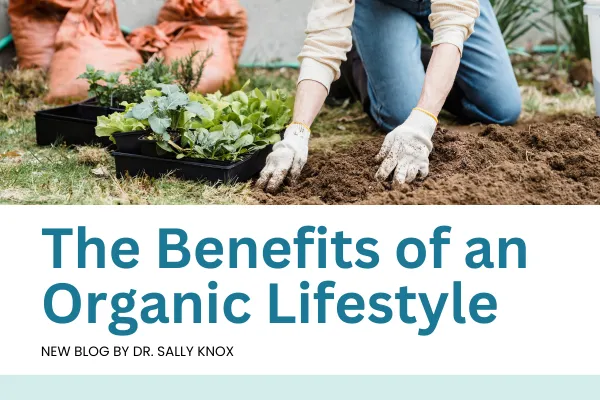Dr. Knox's Recent Blogs

The Benefits of an Organic Lifestyle
Building on our recent blog about eating organic, here are some benefits to simplifying and eating closer to nature (nothing in plastic):
Nutrient-Rich Diet:
Organic foods are often grown without synthetic pesticides and fertilizers and may have higher nutrient content compared to conventionally grown foods. A diet rich in vitamins, minerals, and antioxidants is essential for maintaining overall health and reducing the risk of chronic diseases.
Reduced Exposure to Chemicals:
Organic farming practices typically involve the limited use of synthetic chemicals, which means lower exposure to potentially harmful pesticides, herbicides, and additives. This can reduce the risk of adverse health effects associated with these substances.
Fewer Antibiotics and Hormones:
Organic animal farming typically prohibits the use of antibiotics and growth hormones, which are commonly used in conventional livestock production. Reducing exposure to these substances may help mitigate concerns related to antibiotic resistance and hormone-related health issues.
Improved Food Quality:
Homesteading allows individuals to have more control over the quality of the food they produce. Freshly harvested fruits and vegetables often contain higher levels of vitamins and minerals, and home-raised animals can provide lean, high-quality meat and dairy products.
Sustainable Agriculture:
Homesteading often promotes sustainable farming practices, such as crop rotation, composting, and minimal soil disturbance. These practices can enhance soil health, reduce erosion, and contribute to long-term food security.
Physical Activity:
Managing a homestead typically involves physical labor, such as gardening, animal care, and maintenance tasks. Regular physical activity is associated with numerous health benefits, including weight management and improved cardiovascular health.
Stress Reduction:
Living a simpler life on a homestead can potentially reduce stress levels associated with the fast-paced urban lifestyle. Chronic stress is a known risk factor for various diseases, including heart disease and mental health disorders.
Community and Social Support:
Homesteading often fosters a sense of community and self-sufficiency. Strong social connections and a sense of belonging have been linked to improved mental and emotional well-being.
Cultivating Food Awareness:
Being directly involved in the production of one's food can lead to greater awareness of food choices and a deeper connection to the source of nutrition. This mindfulness can promote healthier eating habits.
Organic food can offer numerous benefits. These practices alone do not guarantee immunity from a disease and people are different. Genetics, lifestyle factors, access to healthcare, and individual behaviors all play significant roles in determining health outcomes.
It's crucial to adopt a balanced approach: A diverse diet, regular exercise, adequate sleep, stress management, and preventive healthcare measures are all vital components of overall well-being. Consulting with healthcare professionals and registered dietitians can provide personalized guidance on how to optimize your health through dietary choices and lifestyle practices.
DOWNLOAD PDF
Resources
Montgomery, D. R., & Biklé, A. (2021). Soil Health and Nutrient Density: Beyond Organic vs. Conventional Farming. Frontiers in Sustainable Food Systems, 5. https://doi.org/10.3389/fsufs.2021.699147
Benbrook, C., Kegley, S. E., & Baker, B. P. (2021). Organic farming lessens reliance on pesticides and promotes public health by lowering dietary risks. Agronomy, 11(7), 1266. https://doi.org/10.3390/agronomy11071266
Manyi-Loh, C. E., Mamphweli, S., Meyer, E. L., & Okoh, A. I. (2018). Antibiotic use in agriculture and its consequential resistance in environmental sources: potential public health implications. Molecules, 23(4), 795. https://doi.org/10.3390/molecules23040795
Cropin. (2023, January 17). Regenerative Agriculture 101. Regenerative Agriculture- Principles & Practices. https://www.cropin.com/blogs/regenerative-agriculture
Santos, M., Moreira, H., Cabral, J. A., Gabriel, R., Ramos, A. T., Bastos, R., & Aires, A. (2022). Contribution of Home Gardens to Sustainable Development: Perspectives from A Supported Opinion Essay. International Journal of Environmental Research and Public Health, 19(20), 13715. https://doi.org/10.3390/ijerph192013715
Copyright SMK ©2025 All Rights Reserved -- Privacy policy | Terms of Service
